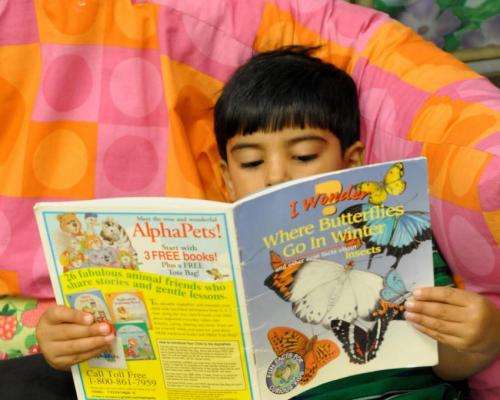Mindfulness helps adults overcome childhood adversity

(Medical Xpress)—With significant implications for early childhood education, new research reveals that a mindful disposition is associated with alleviating lasting physical and emotional effects of childhood adversity. A team of scientists from Temple University, UNC's Frank Porter Graham Child Development Institute (FPG), Child Trends, and the Rockefeller University conducted the groundbreaking study—the first to examine relationships between childhood adversity, mindfulness, and adult health.
Robert Whitaker, professor of public health and pediatrics at Temple University, said the findings are especially important because adults who were abused or neglected as children typically experience poorer health.
"Previous research has shown that childhood traumas worsen adult health through changes in how the body responds to stress," said Whitaker, who led the new study. He added that some people might adopt poor health behaviors, like smoking, to cope with stress.
As a visiting scholar at FPG, Whitaker collaborated with FPG scientist Kathleen Gallagher on the study, which surveyed 2,160 adults working for Head Start, the nation's largest federally-funded early childhood education program. According to Gallagher, one of the study's most striking features is its focus on Head Start teachers and staff, who are responsible for teaching and caring for some of America's most vulnerable children.
"It's essential for adults working with young children to be well—physically and emotionally," said Gallagher. "Better health enables better relationships with children, and research has long demonstrated that good relationships are crucial for children's learning and social-emotional development."
Whitaker explained that when adults provide services to children who are experiencing trauma, it can reactivate in adults an unhealthy stress response to their own childhood adversity. "This can potentially worsen the health and functioning of these adult caregivers," he said.
According to Whitaker, studies have shown the health benefits of learning to be more mindful——focusing on and accepting your reactions to the present moment. Nobody, however, had explored whether mindfulness in adulthood could offset the effects of adverse childhood experiences.
Whitaker's team surveyed 66 Head Start programs across Pennsylvania, asking staff if they experienced emotional, physical, or sexual abuse as children or if they were exposed to other adversities such as household violence, substance abuse, or mental illness. He also asked about their current health, as well their mindfulness—their tendency in daily life to notice what happens as it happens and to be aware and accepting of their thoughts and feelings.
"Nearly one-fourth of our Head Start respondents reported three or more types of adverse childhood experiences," said Whitaker, adding that almost 30 percent reported having three or more stress-related health conditions, such as depression, headache, or back pain.
However, the risk of having multiple health conditions was nearly 50 percent lower among respondents with the highest level of mindfulness compared to those with the lowest levels, even for those with multiple types of childhood adversity. In addition, regardless of the amount of childhood adversity, Head Start workers who were more mindful also reported significantly better health behaviors, like getting enough sleep, and better functioning, including fewer days when they felt unwell mentally or physically.
"Our results suggest that mindfulness may provide some resilience against the poor adult health outcomes that often result from childhood trauma," Whitaker said. "Mindfulness training may help adults, including those with a history of childhood trauma, to improve their own well-being—and to be more effective with children."
The findings compelled Whitaker and Gallagher to begin developing Be Well to Teach Well, an online professional development program designed to help Head Start teachers improve their well-being and classroom interactions.
"In-person training on mindfulness practices is difficult to implement on a large scale and very costly," Gallagher said. "But by providing online training and ongoing coaching, we plan to help many more teachers to be well—and to develop the healthy relationships that are so important for positive child outcomes."
"We need more research on delivering mindfulness training to teachers," said Whitaker. "But there's reason to believe a program for teachers like Be Well to Teach Well will help teachers and children in their classrooms flourish.
More information: Whitaker, R. C., Dearth-Wesley, T., Gooze, R. A., Becker, B. D., Gallagher, K. C., & McEwen, B. S. (2014). Adverse childhood experiences, dispositional mindfulness, and adult health. Preventive Medicine. Advance online publication. DOI: 10.1016/j.ypmed.2014.07.029













